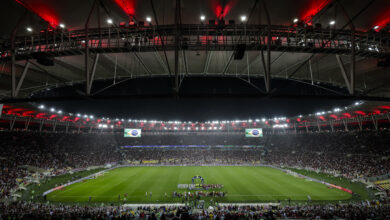Saudi Arabia Spends Millions on Soccer While its Workers Live in Poverty
In LatinAmerican Post, we analyzed the dichotomy between the "wastefulness" of Saudi Arabian soccer clubs and the social and economic reality of the inhabitants of that country.

Photo: Wikimedia, Kylian Mbappe
LatinAmerican Post | Christopher Ramírez Hernández
Listen to this article
Leer en español: Arabia Saudí gasta millones en fútbol mientras sus trabajadores viven en pobreza
On the soccer scene, Saudi Arabia has stood out in recent years for its dazzling purchases of players for exorbitant sums. Major clubs are the protagonists of millionaire transfers, putting the country on the map of the international transfer market.
One of the most talked about is the case of Cristiano Ronaldo. The Portuguese footballer, considered by several experts as one of the best in history, arrived at Al-Nassr with a contract that guarantees him 200 million euros per year (about 500 million until mid-2025).
However, even with this outrageous figure on the world's radar, there is an even more controversial one: amid Kylian Mbappé's back-and-forth with his current club, PSG, the possible interest of Al-Hilal, a prominent Saudi club that would be willing to pay around 300 million euros just for the signing of the French footballer, was leaked.
Of course, as happens on most occasions when such news is known, the complaints were short in coming, even from people close to the football world. One of them was the sports journalist David Faitelson, who expressed anger with the possible transfer of Mbappé to Saudi Arabian soccer.
"What they would pay Mbappé in Saudi Arabia would be unworthy of a footballer. It should be earned by a great surgeon who saves lives, a scientist who seeks a cure for cancer and could, by the way, feed millions of children in the world who go to bed without a bite to eat," was the message left by the Israeli-born Mexican journalist on Twitter.
Is there Extreme Poverty in Saudi Arabia?
This question is frequently read on social networks by users surprised by the amount of money "wasted" on soccer players in recent years and the contrasts that can be seen in some countries where similar situations occur. However, in the case of Saudi society, the answer is "NO,"; or at least that is what the official figures indicate.
According to the Human Development Index (HDI) developed by the United Nations (UN), Saudi Arabia ranked 35th in 2021, with 0.875 (which can be considered very high development).
It also has a GDP per capita (gross domestic product per person) of $30,436, according to World Bank data and OECD national accounts data files. This is higher than countries such as Spain and China, which have much larger populations than Saudi Arabia.
Compared to the United States, which has a GDP per capita of $76,398 and a population of 331.9 million, Saudi Arabia is okay, considering that its population is only one-tenth that of the U.S. (35.4 million).
It may interest you: Can India Overtake the United States and China as a Powerhouse?
The Reality of Immigrants in Saudi Arabia
However, behind these positive figures that, in theory, could endorse the spectacular financial movements, there is a little visible and worrying reality that affects thousands of immigrants living in extreme poverty and with violations of their human rights. While star soccer players have been seduced by offers that would be hard to refuse, promising a life of luxury and comfort, a hidden face needs to be made visible.
Saudi Arabia, like many Persian Gulf countries, relies heavily on foreign labor to sustain its economic growth. Immigrants, mostly from countries with precarious socio-economic situations, such as Nepal, India, Bangladesh, Uganda, Kenya, Philippines, seek employment opportunities in the kingdom. However, many encounter an overwhelming reality of exploitative labor, low wages, and inhumane working and living conditions.
According to investigations such as "The Slaves of the Oil Man" by independent journalists Sébastien Castelier and Quentin Müller, the extreme poverty and human rights violations suffered by migrants in Saudi Arabia contrast sharply with the stratospheric sums spent on acquiring big-name footballers. While clubs invest fortunes in new stars for their squads, thousands of migrant workers face a daily lack of protection and life on the periphery of Saudi society.
According to an interview conducted by Guy Zurkinden with Müller, migrants in the Arabian Peninsula are subject to this kind of treatment because of what he considers a "vital necessity (…) These workers come from impoverished countries (…) Without the salary they send home every month from the Gulf States, their families would not be able to eat every day, and their children would not be able to attend school. That is why they endure years of abuse in the Gulf region."
"Working day and night, beatings, rape, torture. The mistreatment suffered by domestic workers is above all others. For one reason: the hell they endure takes place in the privacy of the home. That is where the true face of these wealthy Saudi, Qatari, Emirati or Bahraini families, who enjoy almost total impunity, is revealed," adds Müller.
In the case of sports, they also give as an example the use of "modern slavery," for instance, for the construction of soccer stadiums in the region, such as what was experienced in the organization of the Qatar 2022 World Cup. According to The Guardian, 6,750 workers died on the World Cup construction sites.
In conclusion, although the purchase of soccer players for millions of dollars is a business and sporting decision that can represent growth for Saudi society, it is also essential to question this industry's role in perpetuating social inequalities. In addition, it is necessary to advocate for adequate protection of the human rights of immigrants, providing them with decent working conditions and access to a life of opportunity and respect for their dignity.




